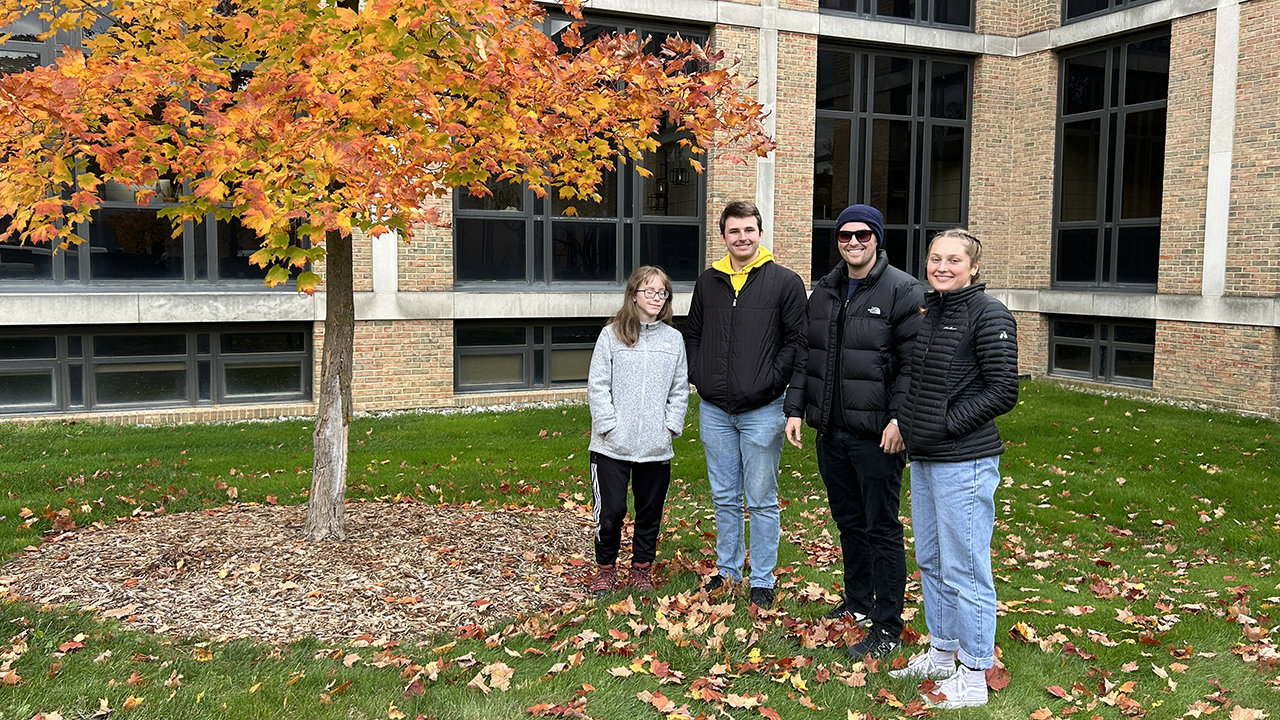Students in the Masters of Engineering in Applied Climate program at the University of Michigan presented their master projects to colleagues in the U-M Department of Climate and Space on Tuesday, November 28. The projects offered a look at issues ranging from flooding and extreme rainfall events to legislative impacts on energy prices.
Three students in the master’s program took an in-depth look at issues related to historic precipitation, severe flooding, extreme rainfall events, and the related impacts on infrastructure and people living in coastal communities.
Olivia Doty and Michael Redmond presented on issues related to flooding along coastal communities, both in the southeastern U.S. along the Atlantic Ocean and in the Great Lakes region. Meanwhile, Caitlyn Feldpausch took a more research-focused approach to study the spatial analysis of extreme rainfall events.
“An NBC news article reported that as of November 9, 2023, the United States has experienced a record of 25 weather disasters, each causing at least $1 billion in damage,” said Feldpausch.
In separate projects, the students each considered a range of impacts, including aging infrastructure, water management practices, impacted communities, climate modeling, available data, and exchanges of information that can help protect people against extreme weather events.
“I spent some time looking at the availability of climate data and how we can translate that data to more accessible information for decision makers,” said Doty. “Climate models project rising sea levels and more extreme weather events in coastal communities, making this an urgent issue.”
They also expressed the importance of considering social justice impacts in Applied Climate projects, when working toward possible climate adaptations, infrastructure planning, and policy reform in the face of climate-related issues.
“Coastal cities are incredibly vulnerable, because compound flooding has disastrous effects on low-income and marginalized communities,” said Redmond. “This represents a huge equity and public health issue.”
Looking at a different climate issue, Brian Cromwell researched the relationship between greenhouse emissions and electricity prices in Michigan and the impact legislative decisions have on those rates.
“Brian has actually been working with one of our alumni, as part of the MI Healthy Climate Program,” said Professor Jeremy Bassis, who teaches in the Applied Climate MEng.
According to the State of Michigan, the MI Healthy Climate Plan lays out a pathway for Michigan to reach 100 percent carbon neutrality by 2050, to avert the worst impacts of the climate crisis, create good-paying jobs, and build a healthier and more prosperous, equitable, and sustainable Michigan.
Cromwell was working on the early stages of his project, which he will continue next term, but he presented a state by state comparison of carbon neutrality plans in the Great Lakes region. He discussed how the plan calls for a number of factors to achieve carbon neutrality, including closing coal plants, transitioning to electric vehicles, and using alternative energy sources, like wind power.
“It is encouraging to see the communities and the universities rising up, and doing their part,” said Cromwell.
While some of the research and project work students conducted during the academic year will continue for years, each student presented recommendations and steps that can be taken now to address climate issues. Many recommendations called upon decision-makers and policy-makers to work with people living in the affected communities, in order to create real solutions that will ease the burden on residents who deal with climate-related risks in their daily lives.
The full list of students and their presentations included:
Brian Cromwell
“Legislation Impacts on Greenhouse Emissions and Electricity Prices in Michigan”
Project Partners: Michigan Department of Environment, Great Lakes, and Energy (EGLE), as well as collaborators at Michigan State University (MSU)
Olivia Doty
“Event Based Scenario Planning to Inform Coastal Communities Adaptation Efforts”
Project Partners: Great Lakes Integrated Sciences and Assessments, A NOAA CAP Team (GLISA, a NOAA CAP Team) and the University of Georgia (UGA)
Caitlyn Feldpausch
“Spatial Analysis of Extreme Rainfall Events Within Michigan and Georgia”
Project Partners: U-M Department of Climate and Space Sciences and Engineering (CLASP), as well as Great Lakes Integrated Sciences and Assessments (GLISA)
Michael Redmond
“Use of Scalability for Flooding, A Look at Detroit”
Project Partners: Great Lakes Integrated Sciences and Assessments (GLISA), and University of Georgia (UGA)
